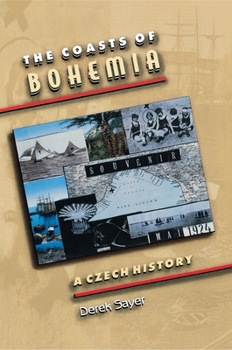The Coasts of Bohemia: A Czech History
Select Format
Select Condition 
Book Overview
Customer Reviews
Rated 5 starsThe Coasts of Bohemia -- a truly beautiful voyage of discovery
Derek Sayer's book is exceptional well written and informative, indeed the text is positively lyrical at times. The aim is to provide an understanding of a "people of whom we know nothing" in Central Europe, and Sayer does a masterful task in shaping and clarifying Czech national identity and national culture. The book is not simply a historical text. While the history is there, and while there is copious scholarly detail...
1Report
Rated 5 starsA Bright but Isolated Star
In The Coasts of Bohemia, Derek Sayers tells us how social values are invented and reinterpreted by those with the will and the power to do so, a study of Bohemian history with broader applications. He writes to clarify and contextualize social movements in the Czech lands from before the Hussites to the modern period, but the reader learns late in the book that his passion owes something to the cooperative assistance of his...
1Report
Rated 5 starsAnother Rave for "Coasts"!
I can only agree with the eloquent rave of the first reader review. COASTS OF BOHEMIA is a miracle. It sweeps through Czech history, presenting a marvelous depth of historical detail while always remaining thoroughly readable, even beautiful, and exciting. Most of all I was impressed with the way in which the author so persuasively demonstrated a remarkable thesis: that a history so unique, particular, and extraordinary...
2Report
Rated 5 starsAcademic history-writing at its best.
This is a marvelous book. It is far and away the best single work available to English-speaking readers with an interest in Czech history and culture. It also more than merits the attention of anyone with an interest in Central Europe, the Western invention known as "Eastern Europe," European cultural history, or cultural history generally.Sayer is quite convincing in making his major arguments: that the Czech lands of Bohemia...
0Report














